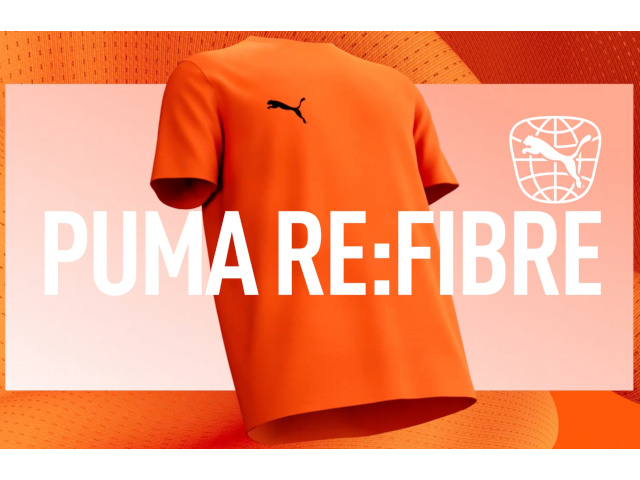PUMA RE:FIBRE technology takes polyester recycling to next level
By Staff Writer 8 December 2023 | Categories: news
PUMA has announced that it has scaled up its textile recycling innovation. Going forward, the company will be replacing recycled polyester with RE:FIBRE technology in all PUMA football club and federation replica jerseys from 2024 onwards.
The RE:FIBRE process uses any polyester material, which includes factory offcuts, faulty goods and pre-loved clothes, allowing new garments to be recycled from any colour textile to any colour desired.
Importantly, the RE:FIBRE process focusses on textile waste as the primary source of material, which is broken down on a chemical level to create new textiles. According to PUMA, the recycled material is just as good as new and can be used for recycling again and again without losing quality. In the past, this was not the case for garments made from recycled polyster. The company believes this makes RE:FIBRE a promising and more sustainable long-term solution for recycling polyester textile waste.
PUMA launced a pilot in 2022 and since then RE:FIBRE technology has been used to create Switzerland and Morocco replica kits for the Women’s World Cup as well as Girona’s 2023/24 season Third kit. In 2024, official PUMA football replica jerseys*, including those for the Euro and Copa América tournaments, will be manufactured using RE:FIBRE recycled materials.
Through the RE:FIBRE programme, PUMA notes it is keen to address the challenge of textile waste via a long-term solution for recycling. The technology also looks to diversify the fashion industry’s main source of recycled polyester in garments from being less reliant on clear plastic bottles.
The four-step process of RE:FIBRE sees:
- Collect and Sort: Collecting and sorting textile waste and other previously wasteful materials.
- Shred and Mix: Shredding and mixing the collected materials down to the minimum.
- Dissolve, Filter and Polymerize: Melting down the shredded polyester and ridding them of previous dyes through a chemical recycling process.
- Melt, Spin, Knit and Sew: The melting allows the newly produced polymers to become ready to be spun and sewn into shape to create good as new RE:FIBRE fabric which can be recycled again and again.
“Our wish is to have 100% of product polyester coming from textile waste,” said Anne-Laure Descours, chief sourcing officer at PUMA. “Textile waste build-up in landfills is an environmental risk. Rethinking the way we produce and moving towards a more circular business model is one of the main priorities of our sustainability strategy.”
PUMA’s ongoing efforts in sustainability has shown the brand improving its rankings on Corporate Knight’s Global 100 Sustainability Index from 77th to 47th.
*excluding locally replicas for Fenerbahçe SK, Shakhtar Donetsk and locally sourced kits.
Most Read Articles

Have Your Say
What new tech or developments are you most anticipating this year?



